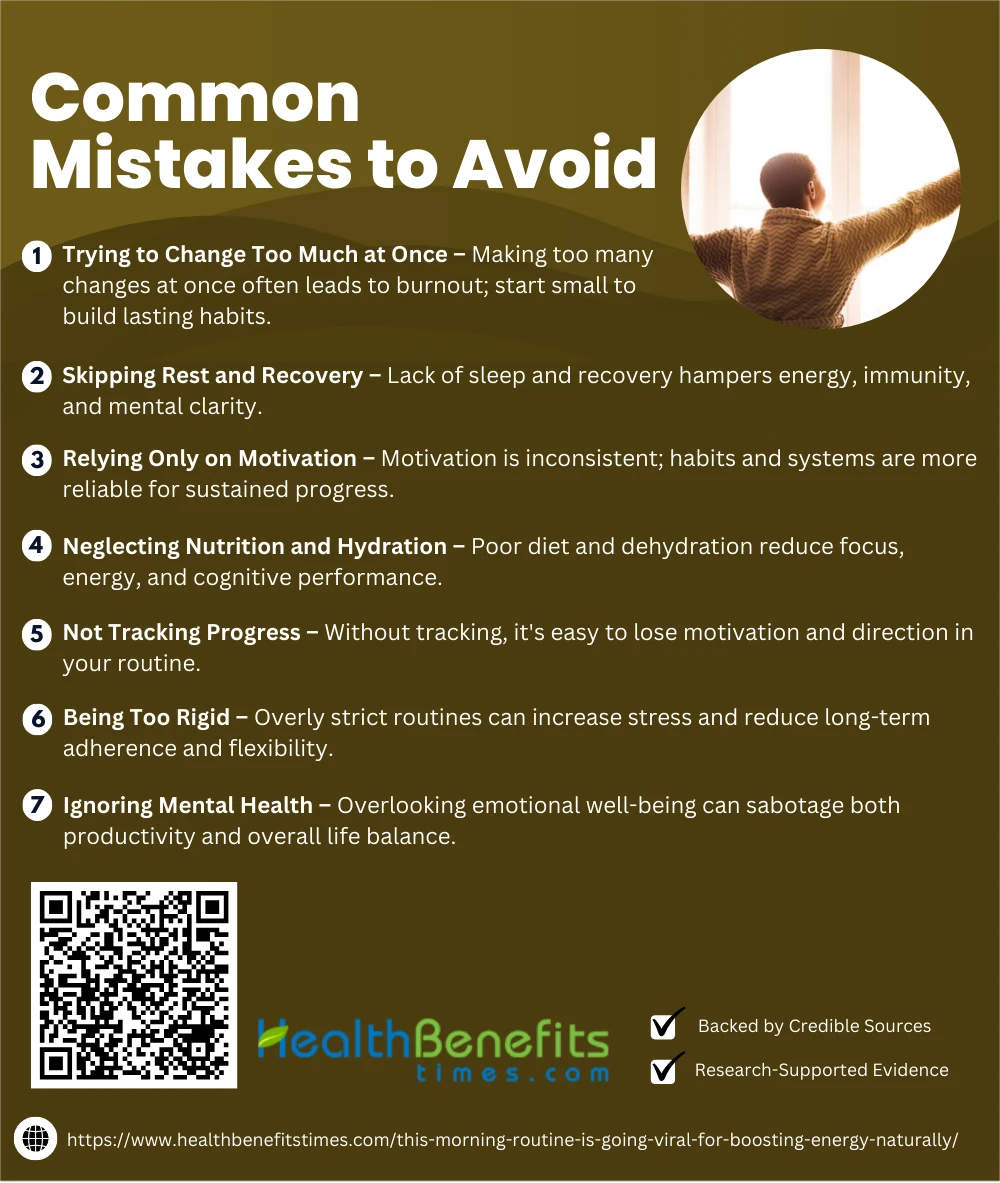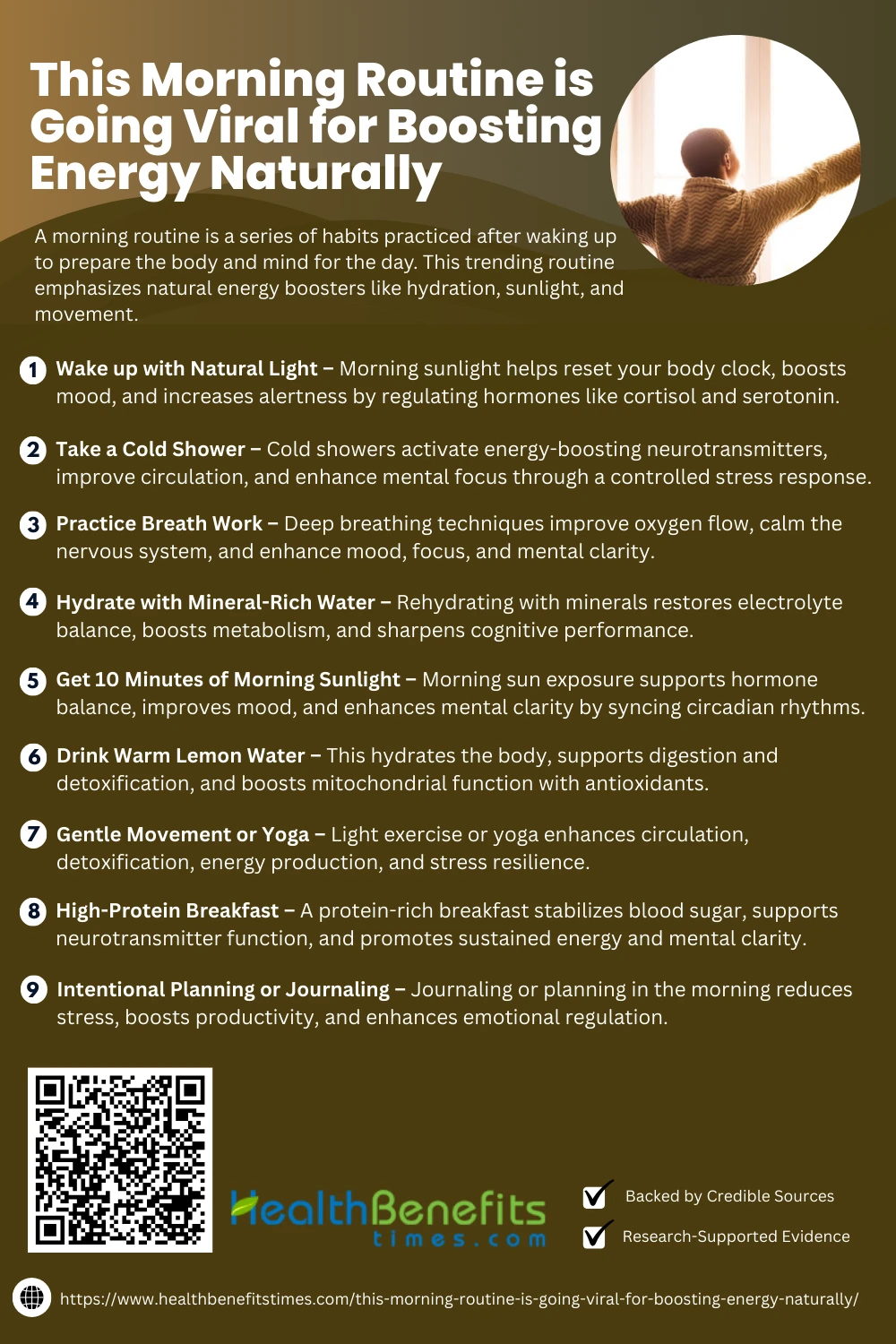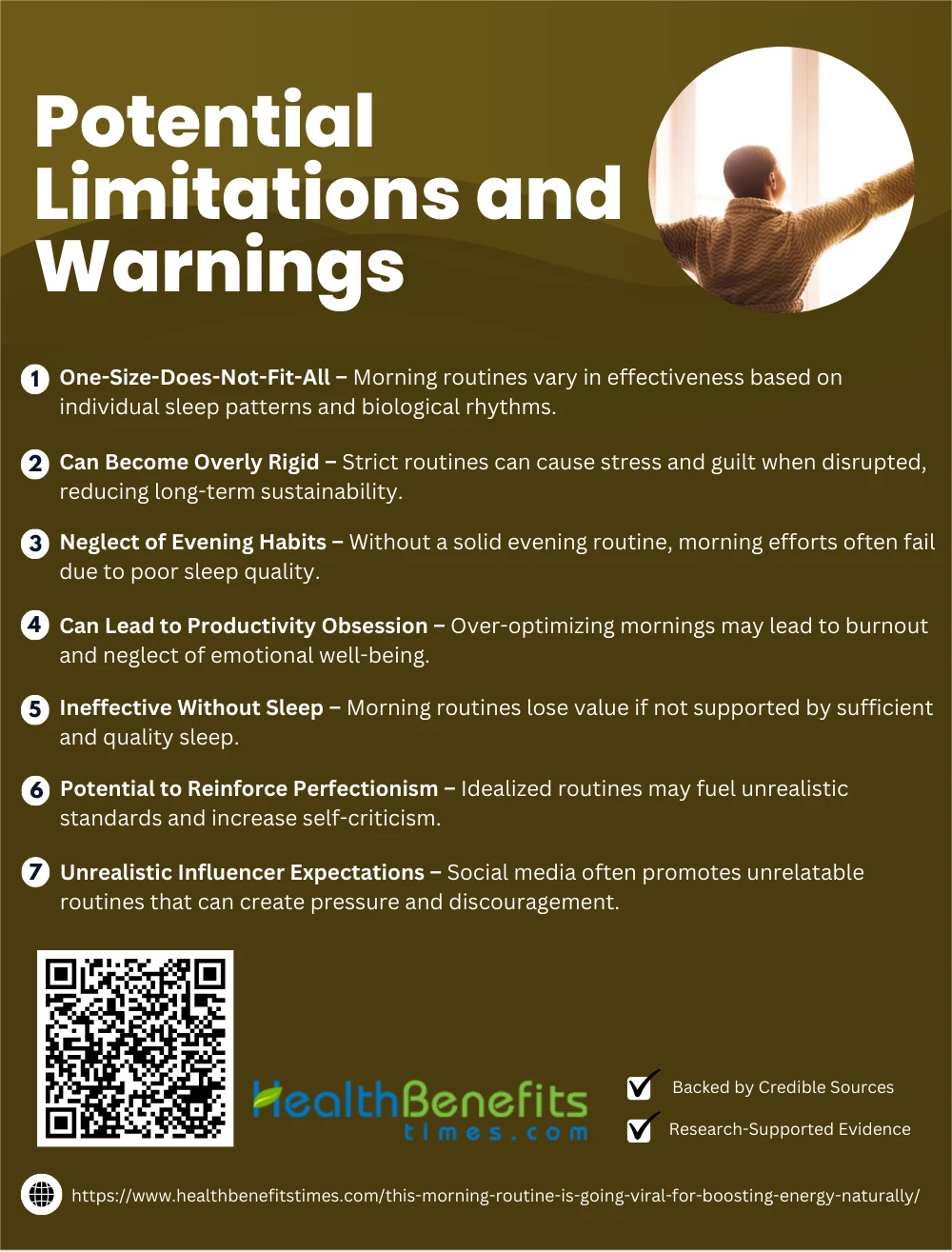- A morning routine is a series of habits practiced after waking up to prepare the body and mind for the day.
- This trending routine emphasizes natural energy boosters like hydration, sunlight, and movement.
- It’s gaining popularity for helping people feel more energized, focused, and productive—without relying on caffeine.
 A morning routine refers to a structured set of habits and activities performed consistently each morning to enhance physical, mental, and emotional well-being. Studies show that structured morning habits are associated with better time management, mood stability, and overall wellness morning routine health impact. Amidst a global shift toward holistic wellness and away from over-reliance on stimulants like caffeine, a particular morning routine is gaining viral attention for its natural energy-boosting effects. Social media platforms like TikTok and Instagram are flooded with users showcasing routines that include early rising, cold water exposure, breathwork, and sunlight — all supported by emerging scientific evidence. For example, aligning activities with our circadian rhythm has been shown to significantly improve energy regulation and mental focus throughout the day. Furthermore, studies also suggest that combining light physical movement and hydration after waking can enhance blood circulation and cognitive alertness, making this trend more than just a viral sensation — it’s a biologically-informed lifestyle shift.
A morning routine refers to a structured set of habits and activities performed consistently each morning to enhance physical, mental, and emotional well-being. Studies show that structured morning habits are associated with better time management, mood stability, and overall wellness morning routine health impact. Amidst a global shift toward holistic wellness and away from over-reliance on stimulants like caffeine, a particular morning routine is gaining viral attention for its natural energy-boosting effects. Social media platforms like TikTok and Instagram are flooded with users showcasing routines that include early rising, cold water exposure, breathwork, and sunlight — all supported by emerging scientific evidence. For example, aligning activities with our circadian rhythm has been shown to significantly improve energy regulation and mental focus throughout the day. Furthermore, studies also suggest that combining light physical movement and hydration after waking can enhance blood circulation and cognitive alertness, making this trend more than just a viral sensation — it’s a biologically-informed lifestyle shift.
Why your Morning Matters
The first hour after waking is more than just a transition from sleep—it’s a biological cue that calibrates our body and mind for the day ahead. Research reveals that our energy levels, cognitive sharpness, and emotional resilience are significantly influenced by what we do upon waking morning routine and emotional energy. (1) Activities like light exposure, hydration, and intentional movement in this crucial window activate circadian rhythm cues, boost mitochondrial activity, and elevate dopamine and cortisol in healthy ranges, leading to improved mental clarity and reduced fatigue morning light improves mood and alertness. (2) Moreover, disruptions or poor habits in the first hour—such as screen overexposure or skipping hydration—can impair decision-making and emotional control throughout the day morning disruption and performance. (3) In short, your first 60 minutes set the neurological and metabolic tone for how well you’ll perform—mentally and physically.
Viral Morning Routine at a Glance
This viral morning routine is gaining traction for its simple yet powerful steps that naturally boost energy. From hydration to movement, each habit helps kickstart your day with vitality.
Waking up with natural sunlight is a scientifically backed strategy to elevate morning energy. Morning light activates the brain’s suprachiasmatic nucleus, synchronizing the circadian rhythm for improved alertness and mood circadian rhythm regulation. (4) Sunlight suppresses melatonin while boosting cortisol, the hormone that naturally energizes us at daybreak cortisol and alertness. (5) It also increases serotonin levels, which enhance mood and motivation serotonin from sunlight. (6) This alignment supports emotional resilience light and emotion link and metabolic efficiency sunlight and energy metabolism. (7) (8)
2. Take a Cold Shower
Cold showers initiate a hormetic stress response that enhances energy by increasing levels of norepinephrine and dopamine — neurotransmitters tied to wakefulness and motivation cold-induced norepinephrine boost. (9) Exposure to cold water also improves metabolic rate and fat oxidation, accelerating calorie burning cold water metabolism effect. (10) This controlled shock enhances resilience by strengthening the nervous system’s stress threshold stress resilience via cold therapy. (11) It also stimulates blood circulation vascular response and energy, delivering oxygen to the brain, which helps sharpen focus cold therapy and brain alertness. (12)
3. Practice Breath work
Breathwork, such as box breathing or diaphragmatic techniques, triggers parasympathetic activation, calming the nervous system while enhancing alertness vagus nerve stimulation through breath. (13) It elevates oxygen intake, flooding cells with energy and reducing brain fog oxygenation and clarity. (14) Studies show that deep breathing elevates dopamine levels, improving motivation and mood dopamine from breathwork. (15) Conscious breathing also reduces cortisol and anxiety breathing and stress regulation, while increasing serotonin and GABA — both associated with relaxed yet focused cognition neurotransmitter balance and breath. (16) (17)
4. Hydrate with Mineral-Rich Water
Morning hydration restores fluid lost overnight, jumpstarting metabolism and cellular activity morning rehydration benefits. (18) Electrolytes like sodium, magnesium, and potassium enhance neural conductivity and energy metabolism electrolyte-enhanced hydration. (19) Proper hydration also improves cognitive clarity and memory hydration and cognition. (20) Even mild dehydration can impair focus and mood mild dehydration effects. (21) Rehydrating with mineral water corrects electrolyte imbalances that develop overnight, thus reducing fatigue and increasing morning alertness hydration and energy restoration. (22)
5. Get 10 Minutes of Morning Sunlight
Exposure to sunlight in the morning resets the circadian clock, optimizing hormone rhythms like cortisol and melatonin to support energy and alertness circadian regulation. It boosts serotonin levels, enhancing mood and focus serotonin stimulation. (23) Morning light also improves cognitive performance and mental clarity cognition via sunlight. (24) It lowers sleep hormone melatonin during the day melatonin suppression and reinforces the cortisol awakening response, fueling natural daytime energy cortisol dynamics. (25) (26)
6. Drink warm lemon water
Warm lemon water promotes hydration and electrolyte balance, both essential for morning energy production electrolytes and hydration. (27) It jumpstarts digestion by stimulating gastric acid and bile flow digestion and metabolism. (28) The vitamin C and antioxidants in lemon also support cellular repair and mitochondrial function energy metabolism source. (29) Additionally, it may mildly alkalize the body and support detoxification detox and gut link. This simple ritual sets a clean metabolic foundation for the day cleansing and organ function.
7. Gentle Movement or Yoga
Low-intensity movement like yoga increases blood circulation, delivering oxygen and nutrients to the brain and muscles for natural energy oxygen to mitochondria. (30) It stimulates the lymphatic system, helping detoxify and reduce fatigue lymphatic stimulation. (31) Regular morning yoga also promotes mitochondrial biogenesis, enhancing your cells’ ability to produce energy mitochondria and yoga. (32) This practice also boosts mood-regulating neurotransmitters yoga and mood states and balances cortisol levels for stress resilience mind-body oxygen balance. (33)
8. High-protein breakfast
Eating a high-protein breakfast enhances mental alertness and sustained energy by stabilizing blood glucose and supporting neurotransmitter production dopamine & satiety. (34) Protein-rich meals increase satiety hormones such as peptide YY, reducing hunger and cravings throughout the day appetite regulation. (35) This nutrient profile also boosts metabolic rate and thermogenesis, enhancing calorie burn energy metabolism impact. (36) Furthermore, protein supports cognitive clarity by providing amino acids essential for brain signaling cognition and breakfast. (37) For individuals prone to fatigue, a high-protein breakfast is proven to reduce brain fog and enhance alertness during demanding tasks mental fatigue reduction. (38)
9. Intentional Planning or Journaling
Starting the day with intentional journaling or planning helps organize mental resources, reducing stress and improving cognitive flexibility journaling and mental clarity. (39) This habit fosters goal-oriented behavior by aligning daily actions with long-term objectives clarity through goal planning. (40) Research shows that expressive writing enhances working memory, freeing up mental capacity for critical thinking writing and cognitive load. (41) Journaling also helps identify and regulate emotional patterns, contributing to emotional stability and resilience emotional regulation via writing. In structured formats like bullet journaling, the practice has been shown to increase productivity and reduce cognitive clutter productivity through structure.
Why People Are Loving It
Morning routines are increasingly praised for their positive impact on mental clarity, productivity, and emotional well-being. User testimonials frequently highlight how structured mornings foster a sense of control and purpose, with platforms like Reddit and Twitter showing thousands of posts under hashtags like #MorningRoutineSuccess. Scientific studies back this trend: a 2020 study from the University of Nottingham found that early risers with consistent routines report higher subjective well-being. Similarly, research published in the Journal of Psychiatric Research links structured wake-up times to reduced depression and anxiety. (42) Furthermore, Harvard Business Review outlines how successful professionals attribute morning rituals like journaling, meditation, or exercise to sustained focus and long-term achievement. This convergence of scientific evidence and personal testimonials underscores why morning routines are gaining widespread popularity’
Natural vs. Artificial Energy Boosters
Here is a comparative table highlighting the key differences between Natural and Artificial Energy Boosters:
| Aspect | Natural Energy Boosters | Artificial Energy Boosters |
| Examples | Sleep, sunlight, hydration, exercise, whole foods | Energy drinks, caffeine pills, sugar-laden snacks |
| Source Type | Organic and body-regulating | Synthetic or processed compounds |
| Energy Duration | Long-lasting, gradual energy release | Short bursts, often followed by crashes |
| Health Impact | Supports long-term well-being | May lead to dependency, heart strain, or jitteriness |
| Common Ingredients | Vitamins, minerals, antioxidants, proteins | Caffeine, taurine, artificial sugars, stimulants |
| Side Effects | Minimal or beneficial (if not excessive) | Insomnia, rapid heartbeat, anxiety, crashes |
| Best Use Cases | Daily routine maintenance, long-term vitality | Temporary boosts, emergencies, or performance stress |
| Scientific Backing | Strong evidence for sustained energy (e.g., Harvard) (43) | Mixed results, often cautionary studies |
| Sustainability | Highly sustainable and habit-forming | Not sustainable; may require increased doses over time |
Common Mistakes to Avoid
Even the best morning routines can lose their impact if common mistakes are made. Avoiding these simple errors can help you maintain energy, focus, and consistency throughout your day.
 1. Trying to Change Too Much at Once
1. Trying to Change Too Much at Once
Overloading your schedule with drastic changes often backfires, leading to burnout and failure. Research by the American Psychological Association shows willpower is a limited resource. The Stanford Behavior Design Lab recommends starting small to build sustainable habits. (44) Likewise, James Clear argues that identity-based habits outlast overwhelming overhauls.
2. Skipping Rest and Recovery
Neglecting rest compromises performance, immunity, and decision-making. According to Harvard Medical School, sleep is essential for memory and mental clarity. NIH studies link sleep deprivation to chronic illness and reduced cognitive function. (45) Additionally, the American Council on Exercise stresses that recovery is critical for physical and mental resilience.
3. Relying Only on Motivation
Depending solely on motivation often leads to inconsistency, as motivation fluctuates daily. Research from University College London reveals that habits, not motivation, drive sustained behavior. James Clear emphasizes environment design over willpower. Additionally, Behavioral Scientist B.J. Fogg advocates for simplicity and system-building over motivational surges. (46)
4. Neglecting Nutrition and Hydration
Poor nutrition and dehydration sabotage energy, focus, and overall performance. A study in the British Journal of Nutrition shows that diet significantly affects cognitive function. CDC research links hydration to physical and mental performance. Meanwhile, Harvard Health stresses that even mild dehydration impairs mood and concentration. (47)
5. Not Tracking Progress
Failing to track progress leads to a lack of accountability and reduced motivation. According to APA research, monitoring goals boosts success rates significantly. A Harvard Business Review article emphasizes the motivational power of small achievements. Additionally, James Clear highlights that habit tracking reinforces identity and builds momentum.
6. Being Too Rigid
Rigid routines can backfire by increasing stress and reducing adaptability. The American Psychological Association reports that flexibility enhances resilience. Stanford researchers found that flexible systems improve long-term adherence. Furthermore, Greater Good Science Center suggests self-compassion during setbacks leads to greater progress than strict discipline.
7. Ignoring Mental Health
Overlooking mental health while optimizing productivity can undermine long-term success. The World Health Organization emphasizes mental well-being as critical to functioning and resilience. (48) According to the National Institute of Mental Health, one in five adults experiences mental illness annually. (49) Harvard Health underscores that tending to mental health boosts focus, creativity, and emotional regulation.
Potential Limitations and Warnings
While morning routines offer many benefits, they aren’t one-size-fits-all. It’s important to recognize potential limitations, listen to your body, and avoid overexertion to ensure the routine supports your well-being.
Morning routines don’t work equally for everyone due to biological chronotypes. Harvard Medical School highlights how “night owls” struggle with early schedules. Sleep Foundation supports tailoring routines to natural rhythms. According to Psychology Today, mismatched schedules can impair cognition, mood, and health outcomes.
2. Can Become Overly Rigid
A strict morning routine can create stress and guilt when disrupted. The American Psychological Association warns against rigidity in wellness habits. Stanford University found that flexibility improves both adherence and mental health. Greater Good Science Center encourages adaptability over perfectionism for sustainable habit formation.
3. Neglect of Evening Habits
Morning routines often fail without proper evening habits. The Sleep Foundation emphasizes winding down to ensure restful sleep. According to Cleveland Clinic, nighttime rituals regulate circadian rhythm and next-day performance. Harvard Health confirms that consistent sleep prep improves focus, mood, and energy—core goals of any morning plan. (50)
4. Can Lead to Productivity Obsession
Over-focusing on morning efficiency may create unhealthy productivity pressure. BBC Future warns of burnout linked to over-optimization. Harvard Business Review highlights that rigid morning goals often ignore emotional needs. Psychology Today points to the mental toll of “toxic productivity,” stressing balance over obsession.
5. Ineffective Without Sleep
Morning routines lose impact if sleep is compromised. CDC highlights that inadequate rest impairs focus, memory, and mood. Sleep Foundation explains that sleep supports decision-making and emotional regulation. Harvard Health stresses that skipping sleep undermines both mental clarity and the physical benefits of a productive start. (51)
6. Potential to Reinforce Perfectionism
Morning routines may unintentionally fuel perfectionism if overly idealized. APA reports a rise in stress and self-criticism linked to perfectionist standards. Psychology Today warns that chasing flawlessness can hinder growth and joy. Berkeley’s Greater Good Science Center emphasizes self-compassion over rigid routine adherence for sustainable well-being.
7. Unrealistic Influencer Expectations
Social media often promotes exaggerated morning routines that set impractical standards. Harvard Business Review critiques influencer-driven habits that overlook individuality. The Guardian highlights the psychological toll of curated perfection. BBC Future warns such routines can create pressure, shame, and routine fatigue in followers.
Conclusion
This viral morning routine proves that small, intentional habits can make a big difference in your daily energy and overall well-being. By focusing on natural strategies—like hydration, movement, mindfulness, and proper nutrition—you can start your day feeling refreshed, focused, and ready to take on anything. While results may vary based on individual lifestyle and needs, the core principle remains the same: consistency creates lasting change. Whether you’re looking to replace your morning coffee or simply feel more alert, this routine offers a sustainable approach. Start small, stay committed, and you might just transform your mornings—and your life—for the better.



